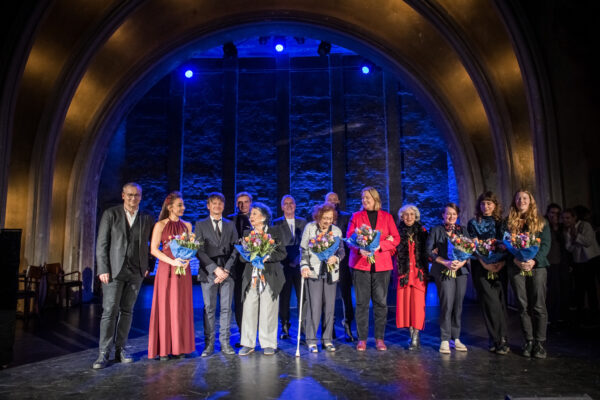The travelling exhibition »›Was damals Recht war…‹ – Soldaten und Zivilisten vor Gerichten der Wehrmacht« (»›What was deemed legal at the time…‹ – Soldiers and Civilians Tried by Wehrmacht Courts«) will be shown at the Nadelfabrik in Aachen from 6 March 2012. The exhibition is hosted by the Aachen Adult Education Centre, the association »Wege gegen das Vergessen« (»Keeping Memory Alive«) and the Foundation Memorial to the Murdered Jews of Europe.
Opening of the exhibition
The formal opening of the exhibition will take place on 6 March 2012 at 6.30 pm in the Nadelfabrik in Aachen. The event will be hosted by Werner Niepenberg, Director of the Aachen Adult Education Centre, and Dr Ulrich Baumann, Deputy Director of the Foundation Memorial to the Murdered Jews of Europe. Prof. Dr Christoph Rass, Professor of Contemporary History at the University of Osnabrück, will give a lecture on »National Socialist military justice and judges – a functional elite before and after 1945«.
Background to the exhibition
The exhibition shows how the Wehrmacht’s judicial system was characterised by injustice and arbitrariness, and how thousands of men and women, soldiers and civilians, became victims of this unjust judicial system and lost their lives as deserters or as so-called »Wehrkraftzersetzer« (»subverters of the war effort«) or »Volksschädlinge« (»vermin«; persons considered harmful to German society). Those who survived the Wehrmacht’s judicial system encountered opposition and hostility from the majority of Germans after 1945. Many still consider those convicted to be traitors or cowards. It was not until September 2009 that the German parliament revoked the remaining convictions of the victims of gross miscarriages of justice under the Wehrmacht’s judicial system during World War Two. The tens of thousands of victims of this judicial system also include members of the resistance from most European countries. They were arrested and tried in countries occupied by the Wehrmacht or in Germany, and many were executed.
Links to Aachen
Two of the case studies in the travelling exhibition are connected with Aachen. Fusilier Stefan Hampel was sentenced to death in 1943 for desertion. Hampel witnessed the mass shooting of Jews in occupied Poland. He told the examining magistrate that the distress this had caused him had been a major factor in his desertion. After his death sentence had been commuted to a 15-year prison term, Hampel entered the murderous penal system of the Wehrmacht. He survived the war but was left with severe physical and psychological scars. He found a new home in Aachen. He publicly recounted his first-hand experiences for the first time in the early 1990s.
On the other side of the legal spectrum was the judge Karl Everts from Ründeroth. After joining the army’s judicial service he soon made a name for himself at the court of the Vienna Division 177 and was promoted to head judge. In 1944 he attracted attention with his ruthless measures against a network of soldiers (and a number of civilians) who had injured each other in order to avoid service on the front. Everts had the suspects tortured to force confessions out of them. After the war, the Austrian courts issued a search warrant for him, but this was unsuccessful. Like many other members of the military justice system, Everts found another post in the German judiciary in the 1950s, this time as a legal counsellor at a district court in Aachen.
Programme of events to accompany the exhibition
To coincide with the exhibition in Aachen, a memorial plaque for the victims of the Wehrmacht’s judicial system will be unveiled by the association «Wege gegen das Vergessen« on 28 March 2010 at 5 pm. This event will be hosted by the mayor, Marcel Philipp. Ludwig Baumann, chairman of the Federal Association of Victims of Military Justice, who has been campaigning for years for the rehabilitation of these victims, will speak about his personal experiences.
There will also be guided tours of the exhibition and many other events.
Partners in the Aachen exhibition
Partner organisations include the Adult Education Centre in Aachen, the association »Wege gegen das Vergessen«, the national programme »Toleranz fördern – Kompetenz stärken« (»Promoting Tolerance – Strengthening Competence«) and the town of Aachen.
Exhibition concept
The exhibition was designed by the Foundation Memorial to the Murdered Jews of Europe in Berlin with the support of the Saxony Memorial Site Foundation, the German Resistance Memorial Centre, The Saxony-Anhalt Memorial Site Foundation –ROTER OCHSE memorial site in Halle (Saale), the Federal Agency for Political Education and the Federal Association of Victims of Military Justice.
For further information on the exhibition, see
http://www.stiftung-denkmal.de/ausstellungen/was-damals-recht-war.html
Press conference:
1 March 2012, 11 am, Nadelfabrik, Reichsweg 19 – 41, 52068 Aachen
Contact for the press conference:
Herr Winfried Casteel, VHS Aachen
Tel.: +49 (0)241 – 47 92 127
Exhibition opening: 6 March 2012, 6.30 pm, Nadelfabrik, Reichsweg 19 – 41, 52068 Aachen
Exhibition venue: Nadelfabrik, Reichsweg 19 – 41, 52068 Aachen
Exhibition dates: 6 to 30 March 2012
Opening hours: Mon – Fri 11 am – 7 pm, Sat and Sun 11 am – 4 pm, free entry
Guided tours of the exhibition: Thurs 15 March, 6 pm / Sat 17 March, 2 pm / Thurs 22 March, 5 pm
For registration/booking, email vhs.wege [at] mail.aachen.de






